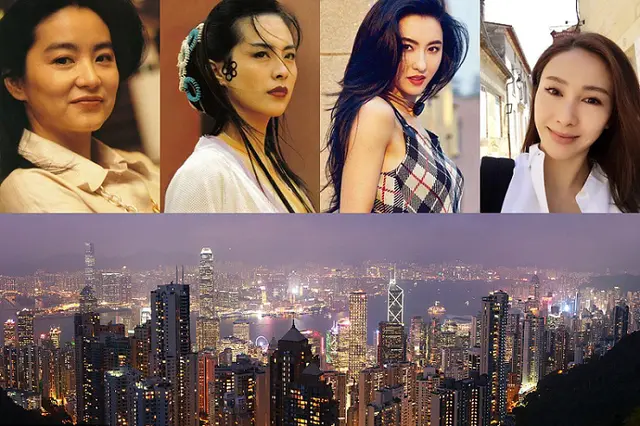Hong Kong, once nicknamed as China's cultural desert, has risen to become a significant cradle of Asian culture in the past four decades.
Elements of traditional Chinese culture combining western cultural influences have shaped Hong Kong in every facet of lifestyle, spanning from the music available to TV dramas, films, books, food and what many people consider to be aesthetically pleasing.
Zhang Qunguan, professor of Shanghai International Studies University, said while it seemed to be improper to talk about the appearance of particular women in the traditional minds of many, Hong Kong people were definitely the exception.
"Hong Kong people take pride in beauty and are always delighted to talk about the power of Hong Kong beauty," he said.
Since the 1980s, Hong Kong has produced a number of influential female celebrities. Beautiful and charming, these celebrities have become an integrated part of Hong Kong culture and contributed a lot to the peak of the special administrative region's entertainment circle.
So, what makes the Hong Kong beauty?
Unique geographical advantages
As a cosmopolitan city in the southern part of China, Hong Kong is renowned for its deep natural harbor, used by many international cargo ships, and its impressive skyline, with a very high density of skyscrapers.
It also stands as one of the world's most significant financial centers.
The factors above have led to a high turnover of people moving into and living in the city, and quite a few foreigners have even decided to permanently move to Hong Kong.
Being born into a mixed-race family is also not a scarce occurrence in Hong Kong.
And it is a universal truth a person of mixed blood has an edge on appearance.
For those who have grown up in a multi-cultural environment, many mixed-raced children have developed a unique character which combines the tradition of eastern people and the openness of westerners.
The photo shows the Top 3 winners of 2006 Miss Hong Kong Pageant. [Photo/VCG]
Miss HK social influence
The Miss Hong Kong Pageant, otherwise known as Miss HK, is a beauty pageant organized by a local Hong Kong television station, Television Broadcasts Limited (TVB).
According to the organizing committee, participants must have a Hong Kong ID or be born in Hong Kong.
The age requirement is between 17 and 27-years-old as of 2011, which has moved up two years from the previous cut off age of 25.
In 2012, as a first for Hong Kong, every citizen with valid identity card was allowed to vote for the candidates.
The Miss Hone Kong Pageant also has no demanding entry criteria and has a wider public participation rate, which attracts many young women to achieve their dreams.
Moreover, the competition has had a range of young women who have reached superstardom.
The pageant started in 1973, and has become a competition and cultural symbol for the locals.
Many well-known artists and celebrities have risen to fame thanks to the competition. For instance, actress Angie Chiu was the third runner-up in the first season of the Miss Hone Kong Pageant. Michelle Reis, who was another female celebrity, was the winner of 1988 competition.
A movie fan paints some classic female roles from Hong Kong movies to express the love of Hong Kong culture. [Photo/Mtime]
Classic TV and film roles
In 2017, the return of the classic movie A Chinese Odyssey Part Two: Cinderella to the big screen, as well as the reshooting of The Legend of the Condor Heroes, strike a chord with Chinese movie-goers.
To a majority of Chinese generations, born between 1970 and 1990, the golden-twenty-years (1980-2000) marks an unforgettable period of Hong Kong culture.
During this period, a large number of influential TV dramas, films and musical albums were produced.
Taking the Hong Kong film industry as an example, the golden twenty years helped Hong Kong to win the attention of many at home and abroad.
Hong Kong films flourish in all genres from comedy to thrillers, action movies, traditional combats, romance and literary films.
Some vivid characters from movies have also shaped the way people think of the certain topics in the daily life.
When talking about qipao, for example, most Chinese people think about the romantic lady Su Li-zhen, who was played by Maggie Cheung, in the movie In the Mood for Love. The actress was reputed in China as the “most beautiful woman in qipao" by most Chinese online netizens.
Then, in the hit South Korean TV soap Reply 1994, university students would often speak high of the Hong Kong actress Joey Wong. During one scene of the series, a man asked “who is the most beautiful woman in the world?” and the man he was speaking to replied “Nip Siu-sin”.
Nip Siu-sin is actually a classic ghost image in the Chinese legend, who lures young men to their death in a bid to keep herself young and beautiful. The character was played by Joey Wong in the romantic comedy movie A Chinese Ghost Story. The film was popular in Hong Kong and several Asian countries, including South Korea and Japan.
Also, the love story Farewell My Concubine, released on January 1, 1993, was the only Chinese film awarded the Palme d'Or at the Cannes Film Festival.
The classic role from a certain movie, the melody song from a certain album all call wake up our best memories.
(CHINA DAILY)
 简体中文
简体中文

